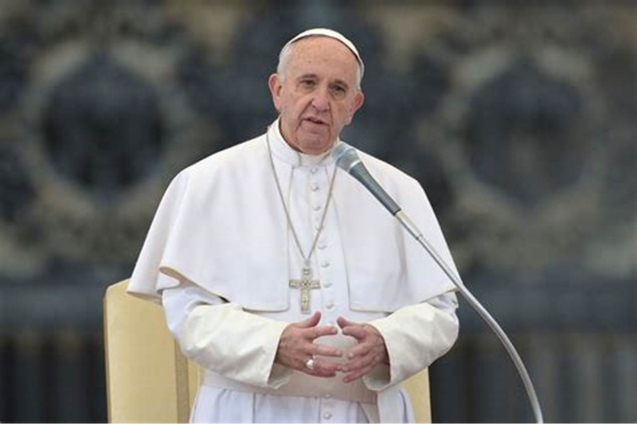Attending to the Baghdad church where he works as a caretaker, Natiq Anwar relives the most horrific experience of his life each and every day.
Near the pew where the 66-year-old sits, a scattering of crimson tiles marks the places where churchgoers and clergy died 10 years ago.
The sacristy, a tiny room next to the altar, is packed with bad memories. Dozens of worshipers sought refuge here as terrorists laid siege to the church. Many were gunned down, or killed by grenades, leaving behind blood-stained hand prints on the walls.
Natiq, as well as his wife and child, were among them.
Today, Our Lady of Salvation Church is adorned with the engraved names of those who were murdered on that day -- 51 congregants and two priests.
The attack left Anwar partially blinded, his right arm badly injured.
Eyes half closed, he looks towards a new addition to the church: A white throne, positioned below a towering collage of the parish's martyrs. Pope Francis is set to deliver a speech here when he arrives in Iraq on Friday.
"I'm extremely happy. I'm very, very happy," Anwar said, looking ahead to the visit.
Despite his effusive words, the caretaker looks slightly non-plussed.
"I want to tell him to look after us," he added, "because the state doesn't look after us."
But Anwar will not be among the small gathering of church members to greet the Pontiff here during his historic visit.
Because of the pandemic, crowds are being kept away.
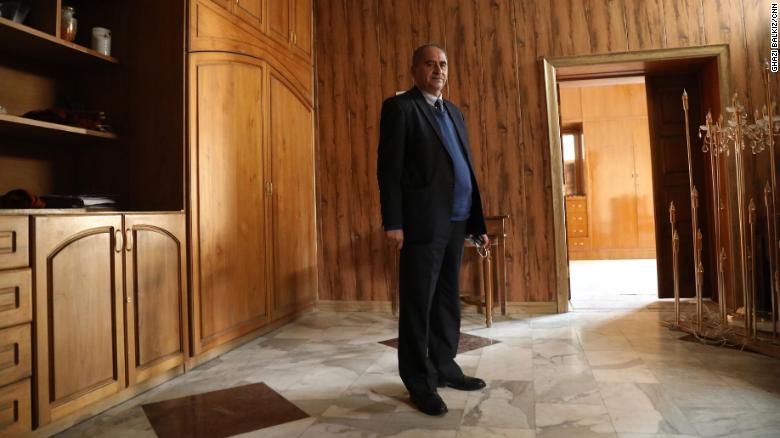
Instead, the papal visit -- a four-day, six-city tour of the country -- will be limited to a handful of small gatherings and visits to sites linked to the Bible.
The vast majority of Iraq's Christians will watch the tour -- the first by a pontiff to Iraq -- on television. A complete curfew is being imposed for the duration of the trip.
These stringent measures have been taken to mitigate the risks of the visit, which is considered Pope Francis' most dangerous trip so far, both because of a nationwide spike in coronavirus cases and because of an uptick in violence in the war-ravaged country.
"Pope Francis coming to Iraq highlights the significance of our country for the faithful from all over the world," said a senior official inside the president's office.
"It is also an affirmation of [the] Pope's support for peace in Iraq, a testament to the reverence of Iraq's Christians."
This visit comes at a challenging time for Iraq, but we are taking all necessary coronavirus precautions," the official said.
It had been widely expected that the trip, announced last December, would be canceled.
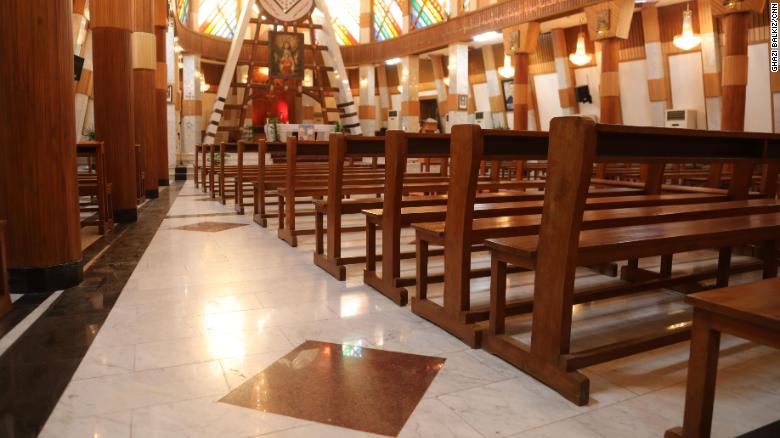
In late January, a twin suicide bombing claimed by ISIS rocked a busy Baghdad marketplace.
Rocket attacks by Iran-backed armed groups targeting US positions in the country have become more frequent.
And just three days before the Pope was due to arrive, rockets hit an airbase housing US troops.
The country's Covid-19 surge also continues unabated -- last weekend, the Vatican's own envoy to Iraq, Mitja Leskovar, tested positive for the virus.
Still, the pope insists he won't let Iraqis down.
At the end of a general audience Wednesday, the pontiff made no mention of the deteriorating security situation in Iraq but said: "For some time I have wanted to meet that people who suffered so much, and meet that martyred Church."
"The people of Iraq are waiting for us. They were waiting for St. Pope John Paul II, who was not allowed to go," he said, referring to a planned trip in 2000 which was canceled after a breakdown in talks between the Vatican and then President Saddam Hussein.
"The people cannot be let down for a second time. Let us pray that this trip can be carried out well."
The Vatican called the trip "an act of love.""All the precautions have been taken from a health point of view," Vatican spokesman Matteo Bruni told journalists at a briefing on Tuesday.
"The best way to interpret the journey is as an act of love; it's a gesture of love from the Pope to the people of this land who need to receive it."
That's a message that rings true for many Iraqis.
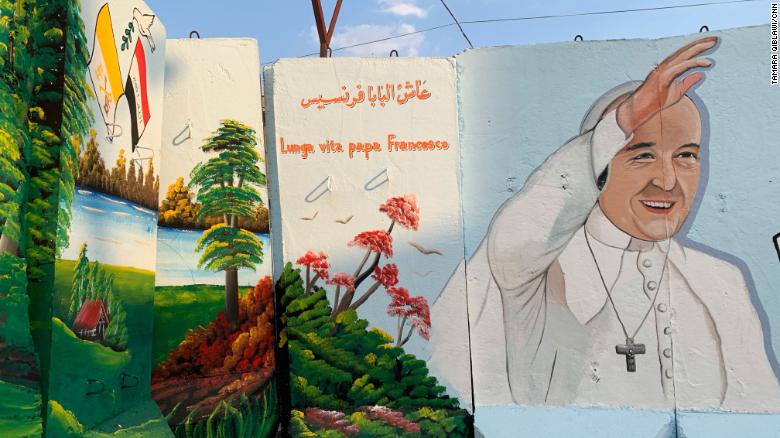
In addition to Our Lady of Salvation, Pope Francis is set to visit several other sites associated with some of Iraq's worst tragedies in its decades of turmoil, including Mosul, the largest city occupied, and ravaged, by ISIS.
He will also hold a meeting at a cathedral in the northern Christian-majority city of Qaraqosh.
ISIS converted the courtyard of the Immaculate Conception Church into a shooting range.
They set the church's contents ablaze, blackening the interiors and destroying its statues.
ISIS members piled up the church's bibles, books and prayer books and torched them.
A large black spot in the courtyard remains, marking the spot where they were burned.
Iraq's Christians are keen for the Pontiff to tend to their wounds.
But they also hope the trip will underscore the plight of their dwindling community.
Before the 2003 US invasion, there were 1.5 million Christians in the country. Around 80% of them have since fled the country, according to leading Christian clerics there.
Other minorities that contributed to Iraq's once-dazzling diversity are also fast disappearing, including Mandaens -- followers of pre-Islamic monotheistic faiths -- and Yazidis, who bore the brunt of ISIS' horrors during the extremist group's years-long reign of terror in northern Iraq.
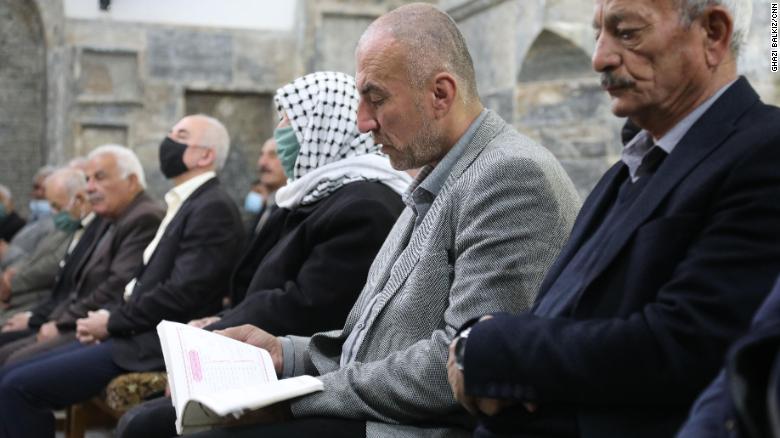
"What frightens me is that during this period no one has asked what we, for example, have lost," Bashar Warda, Chaldean Archbishop of the northern city of Erbil, told CNN.
"We have a declining number of the Mandeans, and now the Yazidis, Christians."
They don't care about this," he said, referring to the political elite in Baghdad.
"As they did not care when we lost the Jewish community back in the 40s, 50s and 60s. And this cycle is going."
Sabah Zeitoun moved to Sweden, now home to a large Arab Christian community, some 21 years ago. He is back in Erbil for a visit, and extended his trip in order to be here for the Pope's tour.
He believes that those who have left the country have gone for good. "I don't think anyone will return from Europe," the 65-year-old said.
"That would be difficult."Zeitoun served as a soldier for eight years during the Iraq-Iran war in the 1980s.
He was deployed to Kuwait during former Iraqi President Saddam Hussein's invasion of the country.
When he returned, he opened a liquor store in Mosul.
In 2000, he said he was arrested and detained for three days because he kept his store open five minutes beyond the country's legally sanctioned closing time.
That was the point at which he decided to leave Iraq.
Latest Stories
-
We must all help build an equitable, resilient education system – Clement Apaak urges
5 minutes -
My administration will improve your conditions of service – Mahama assures GMA
14 minutes -
2025 edition of Ghana Music Festival USA slated for May 30-June 1 in Atlanta
16 minutes -
Out-of-Pocket costs, funding cuts threaten maternal health progress in Ghana; experts call for unified action
17 minutes -
We’re determined to ensure every programme delivers maximum efficiency and impact – Finance Minister
18 minutes -
Finance Ministry to establish compliance desk under new PFM Act reforms
23 minutes -
GAF: Mahama charges newly commissioned officers to lead with integrity and courage
27 minutes -
Let’s work together to make VRA great again – Acting CEO Obeng Kenzo urges staff
37 minutes -
Ghana demands your devotion and patriotic service – Mahama to newly commissioned officers
53 minutes -
King Promise appoints Tilly Akua Nipaa as PRO for 2025 TGMA campaign
57 minutes -
Vision F.C. coach bemoans profligacy ahead of Hearts test
1 hour -
‘My dad has done a lot for us’ – Jordan Ayew
1 hour -
West African Boxing Union suspends President Remi Aboderin
1 hour -
ECG was in a good and healthy position when I left office – Dubik Mahama
2 hours -
Samini inks promotional deal with Audiomack ahead of ‘ORIGIN8A’ album release
2 hours

